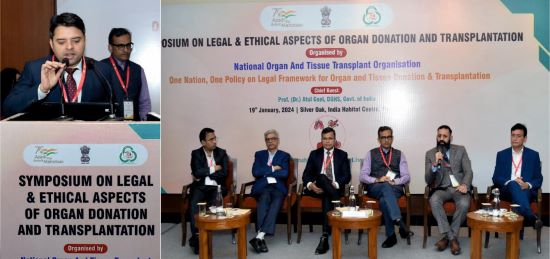Home / Newsletters / ITN 71 / Subscribe
National Symposium on Legal and Ethical Aspects of Organ Donation and Transplantation
Sunil Shroff
Indian Transplant Newsletter. 2024 Jan-Mar; 23(1):p13
Print ISSN 0972 - 1568
Online ISSN 3048 - 653X
PDF
The National Organ & Tissue Transplant Organization (NOTTO), Government of India hosted a national symposium titled 'Legal and Ethical Aspects of Organ Donation and Transplantation' on January 19, 2024, at the India Habitat Centre in New Delhi. The symposium aimed to establish uniform legal and ethical frameworks for organ donation and transplantation nationwide.

Dr Sanjay Nagral, Co-chair of the DICG, delivered a keynote speech addressing ethical dilemmas and challenges concerning organ donation and transplantation in India. He discussed the multifaceted ethical dimensions of these practices, emphasizing the lack of uniformity in donation and transplantation procedures. Dr Nagral highlighted the recent global guidelines, notably the Declaration of Istanbul, aimed at building public trust in the donation process while advocating against commercialism, trafficking, and human rights violations in transplantation.
The program featured several panels, each addressing distinct topics, and the discussions unfolded as follows:
Key Legal Procedures
Non-Transplant Organ Retrieval Centres (NTORCs) - Challenges encountered by NTORCs including cumbersome licensing process, insufficient knowledge of brain death certification, managing postmortem cases, limitations in resources for maintaining brain dead donors and infrastructure, and lack of trained experts to certify brain death were discussed.
Living donation - The panel discussed using DNA profiling for cases of suspected document fabrication, developing standardized SOPs for SWAP donations and minor living donors in exceptional medical cases, requiring thorough justification and approvals.
Protecting data privacy - Protecting the privacy of donors and recipients in organ donation requires robust laws. Transparency and ethical handling of personal data, including deceased donor information, must be ensured.
Brainstem Death
The panel discussed the importance of integrating Brainstem Death (BSD) education into medical curriculum, formalize BSD declaration as a statutory requirement, provide incentives to encourage personnel involved in BSD certification, establish Government Centers of Excellence to enhance public hospital participation for underprivileged individuals, continued awareness and media campaigns to bridge awareness gaps.

Swap Transplant Program
Allowing non-near relative donors for SWAP donations necessitates amending the organ transplant legislation. SWAP transplant broadens the pool of living kidney donors and could be made economically viable. Additionally, it enhances the quality of organ matches.
Issues with Organ Donation and Transplantation of Foreigners in India
The panel addressed several areas, including mandatory registration for all foreign nationals coming to India for transplantation with NOTTO, provision of interpreters for foreign patients, the necessity for SOPs and guidelines for transplant procedures in foreign nationals in India, and the implementation of rigorous audits for transplant process for foreign patients.
Facilitating Organ Donation and Transplantation in MLC and in Non-MLC
The panel highlighted Tamil Nadu's approach, featuring a web application, dedicated transplant coordinators, and ongoing training for deceased donation programs. They also stressed the importance of increasing awareness through Information, Education, and Communication (IEC) efforts, clarifying stakeholder roles, and considering simultaneous or virtual autopsies to smoothen the process.
Possible Legal and Ethical Solutions in Organ Transplantation in India
While organ donations have increased, logistical challenges persist. There's a notable divide in deceased organ donations between northern and southern regions. The current system relies heavily on individual efforts, lacking uniform legal understanding.
Separating organ donation from life support withdrawal was emphasized, citing drawbacks like perpetuating unethical practices and burdens on families. Donation after circulatory death and thereby increasing the donor pool was also discussed.
Concerns were raised regarding India's readiness for an opt-out system due to fears of unethical organ use. Experiences from other countries show initial increases in donation rates, plateauing later. Spain's success attributes to both opt-out systems and extensive public education. Each country should assess which system aligns with its political framework.
Source: National Organ & Tissue Transplant Organization (NOTTO)
Available at:
https://www.itnnews.co.in/indian-transplant-newsletter/issue71/National-Symposium-on-Legal-and-Ethical-Aspects-of-Organ-Donation-and-Transplantation-1302.htm
- Copyright © 2025. Published by MOHAN Foundation
